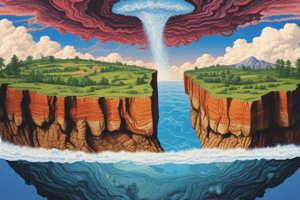Podcast
Questions and Answers
What do geologic processes of Earth describe?
What do geologic processes of Earth describe?
- The impact of pollution on the planet's surface
- The natural forces that influence the shape and structure of the planet (correct)
- The human impact on the shape and structure of the planet
- The effects of climate change on the planet's structure
What are exogenous processes?
What are exogenous processes?
- Processes related to the atmosphere of Earth
- Internal processes that occur deep within the Earth
- Processes that occur on or near the surface of Earth (correct)
- Processes that influence the planet's atmosphere
Which is an example of an exogenous process?
Which is an example of an exogenous process?
- Sedimentation
- Plate tectonics
- Volcanic eruptions
- Weathering of rocks (correct)
What is the main focus of studying geologic processes?
What is the main focus of studying geologic processes?
How are geologic processes broken down?
How are geologic processes broken down?
What is weathering?
What is weathering?
What is the main difference between weathering and erosion?
What is the main difference between weathering and erosion?
Which process involves rocks being broken down into smaller pieces without altering the chemical composition?
Which process involves rocks being broken down into smaller pieces without altering the chemical composition?
What happens when water enters cracks in a rock, freezes, and expands?
What happens when water enters cracks in a rock, freezes, and expands?
Which climate is prone to weathering due to the abrupt shifts in temperature?
Which climate is prone to weathering due to the abrupt shifts in temperature?
What causes mechanical disintegration, splitting, or break up of rock by the pressure of water freezing in cracks?
What causes mechanical disintegration, splitting, or break up of rock by the pressure of water freezing in cracks?
Which process involves the expansion of rock caused by lifting and erosion, leading to rock breaking off into sheets along joints that parallel the surface?
Which process involves the expansion of rock caused by lifting and erosion, leading to rock breaking off into sheets along joints that parallel the surface?
What can hot temperature cause in rocks?
What can hot temperature cause in rocks?
What does wind carry that can wear away rocks when collided with other rocks?
What does wind carry that can wear away rocks when collided with other rocks?
In what type of climate does thermal expansion typically occur?
In what type of climate does thermal expansion typically occur?
What is a result of rain over a long period of time?
What is a result of rain over a long period of time?
Flashcards are hidden until you start studying
Study Notes
Geologic Processes of Earth
- Describe the dynamic and constantly changing nature of the Earth's surface
Exogenous Processes
- External processes that shape the Earth's surface, driven by energy from the sun and atmosphere
- Example: weathering and erosion
Weathering
- Process of breaking down rocks into smaller pieces without altering their chemical composition
- Can be chemical (altering the rock's chemical makeup) or mechanical (physically breaking the rock apart)
Weathering vs. Erosion
- Weathering: rocks broken down into smaller pieces, still in their original location
- Erosion: rocks or sediments transported away from their original location
Mechanical Weathering
- Process of rocks being broken down into smaller pieces without altering their chemical composition
- Examples:
- Freeze-thaw weathering: water enters cracks in a rock, freezes, and expands, causing the rock to break apart
- Thermal expansion: rocks expand and contract with temperature changes, causing cracks and breakage
Climate and Weathering
- Abrupt shifts in temperature, typical in polar climates, can cause weathering
- Thermal expansion typically occurs in hot and cold desert climates
Erosion
- Process of rocks or sediments being transported away from their original location
- Examples:
- Exfoliation: rocks breaking off into sheets along joints that parallel the surface
- Wind erosion: wind carrying sand or other particles that can wear away rocks when collided with other rocks
Effects of Temperature and Rain
- High temperatures can cause rocks to crack and break apart
- Long-term rain can cause chemical weathering and erosion
Studying That Suits You
Use AI to generate personalized quizzes and flashcards to suit your learning preferences.




